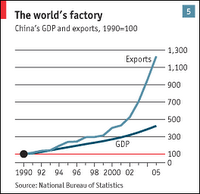

“Let China sleep, for when she awakes, she will shake the world.” –Napoleon
One of the themes of this blog has been that China, India and other developing countries are giving the world economy most of its recent boost. The Economist Magazine in its recent survey of the world economy calls China and India (Chindia) the “new titans.”
Over at UCI, Professor Peter Navaro has published his new book called The Coming China Wars. Navarro also wrote an interesting article for this week’s Barron’s Magazine that explains how the Chinese manufacturers can undercut competitors' prices by 30% to 50%. In the article, Navaro describes the University of California/Irvine's China Price Project which is in the process of examining the major economic drivers of China's competitive advantages to provide “clarity about how China became the world's factory.”
I plan to read Professor Navaro’s book on my iPod over the break. If you want to review the book for a Discussion Board post that would be grand. I’ll read this book with interest since I have had a long standing interest in China and the Chinese economy, having visited China on numerous occasions. I don’t care for the “war” metaphor, but I suppose that is what it takes to grab attention and sell books in a competitive media market.
Recently the online media has begun focusing on the implications of rapid economic development in China. The growth of China's economy has no equal in modern history. Since China set about reforming its economy more than a generation ago, its GDP has expanded at an annual rate of close to %. The country is closing in on a 30-year run during which its economy has doubled nearly three times. China’s surge is a revolutionary upheaval in global economic power, comparable to the rise of the US between 1860 and 1910.
For an interesting series of broadcasts and podcasts about the Chinese economy from the Marketplace radio show, click here.
Over at UCI, Professor Peter Navaro has published his new book called The Coming China Wars. Navarro also wrote an interesting article for this week’s Barron’s Magazine that explains how the Chinese manufacturers can undercut competitors' prices by 30% to 50%. In the article, Navaro describes the University of California/Irvine's China Price Project which is in the process of examining the major economic drivers of China's competitive advantages to provide “clarity about how China became the world's factory.”
I plan to read Professor Navaro’s book on my iPod over the break. If you want to review the book for a Discussion Board post that would be grand. I’ll read this book with interest since I have had a long standing interest in China and the Chinese economy, having visited China on numerous occasions. I don’t care for the “war” metaphor, but I suppose that is what it takes to grab attention and sell books in a competitive media market.
Recently the online media has begun focusing on the implications of rapid economic development in China. The growth of China's economy has no equal in modern history. Since China set about reforming its economy more than a generation ago, its GDP has expanded at an annual rate of close to %. The country is closing in on a 30-year run during which its economy has doubled nearly three times. China’s surge is a revolutionary upheaval in global economic power, comparable to the rise of the US between 1860 and 1910.
For an interesting series of broadcasts and podcasts about the Chinese economy from the Marketplace radio show, click here.
China's growing importance in global macroeconomics raises a number of interesting questions that you can thrash out on the Discussion Board. For example:
1. Is the rapid development of the Chinese economy be good or bad for the U.S.?
2. Describe the ways in which the U.S. may benefit from greater economic development in China.
3. Describe the ways in which the U.S. may be harmed by greater economic development in China.
4. What macro policies should the U.S. adopt to adjust to China's growing economic importance?
Extra Credit: Who is the guy in the picture? Critics and supporters alike agree that his reforms helped bring China closer to capitalism. If you are the first student to send me an e-mail (kwoodward@saddleback.edu) with the answer, you will be rewarded with two extra credit Discussion Board points. Only two points extra credit per student can be earned in any given week from the blog questions.
Extra Credit: Who is the guy in the picture? Critics and supporters alike agree that his reforms helped bring China closer to capitalism. If you are the first student to send me an e-mail (kwoodward@saddleback.edu) with the answer, you will be rewarded with two extra credit Discussion Board points. Only two points extra credit per student can be earned in any given week from the blog questions.
No comments:
Post a Comment